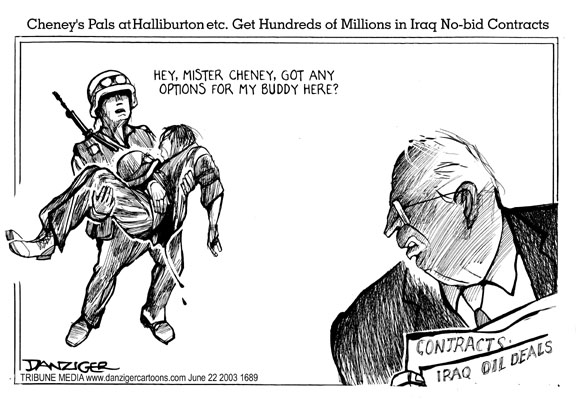From a Canadian review of the Frontline documentary that aired in two parts:
From the first post-9/11 rumblings from Vice-President Dick Cheney wishfully linking al-Qaida and Saddam Hussein, the story of the war in Iraq reads like a how-not-to manual in superpower conduct: Flawed invasion plans dictated by competitive pride between Rumsfeld and Secretary of State Colin Powell, ideologically driven reconstruction plans based on massive delusions about the country and the region; sabotage, misinformation and intimidation by the vice-president against squeamish colleagues; and, all of it unchecked by a dangerously shallow president evidently in way over his head.
The casualties so far, above and beyond the 4,000 lives lost on one side and the millions lost, destroyed and displaced in Iraq, include: America's political and diplomatic reputation; the health of the world's largest economy; the legitimate battle for Afghanistan; the equilibrium of the Iran/Iraq balance of regional influence; America's promotion of democracy internationally; a half-century of consensus on just war principles; America's credibility on human rights; and on and on and on.
Truth, traditionally the first casualty of war, was actually lost long before the first bomb was dropped.
The Iraq policies of John McCain, Hillary Clinton and Barack Obama all have one thing in common: They're meaningless. To paraphrase Obama adviser Samantha Power just before she resigned for saying this (among other things); whoever is the next president will have to make strategic determinations based on the reality on the ground as of January, 2009, not as of a campaign debate held in January 2008.
If you missed this, you can watch the full series online at the link above. You can also see maps, and timelines, see slideshows & video, chat, and read battlefield stories and comments from the producer Michael Kirk.
Another in depth, fascinating documentary made by Bill Moyers called Buying the War answers a question we've all asked: Why did the mainstream media get it so wrong? From the PBS website:
How did the mainstream press get it so wrong? How did the evidence disputing the existence of weapons of mass destruction and the link between Saddam Hussein to 9-11 continue to go largely unreported? "What the conservative media did was easy to fathom; they had been cheerleaders for the White House from the beginning and were simply continuing to rally the public behind the President — no questions asked. How mainstream journalists suspended skepticism and scrutiny remains an issue of significance that the media has not satisfactorily explored," says Moyers. "How the administration marketed the war to the American people has been well covered, but critical questions remain: How and why did the press buy it, and what does it say about the role of journalists in helping the public sort out fact from propaganda?"I would also suggest reading this article The Future of Iraq: The Spoils of War:
Iraq's massive oil reserves, the third-largest in the world, are about to be thrown open for large-scale exploitation by Western oil companies under a controversial law which is expected to come before the Iraqi parliament within days.
The US government has been involved in drawing up the law, a draft of which has been seen by The Independent on Sunday. It would give big oil companies such as BP, Shell and Exxon 30-year contracts to extract Iraqi crude and allow the first large-scale operation of foreign oil interests in the country since the industry was nationalised in 1972.
The huge potential prizes for Western firms will give ammunition to critics who say the Iraq war was fought for oil. They point to statements such as one from Vice-President Dick Cheney, who said in 1999, while he was still chief executive of the oil services company Halliburton, that the world would need an additional 50 million barrels of oil a day by 2010. "So where is the oil going to come from?... The Middle East, with two-thirds of the world's oil and the lowest cost, is still where the prize ultimately lies," he said.
Sia

1 comment:
Thank you for what you do.
Post a Comment